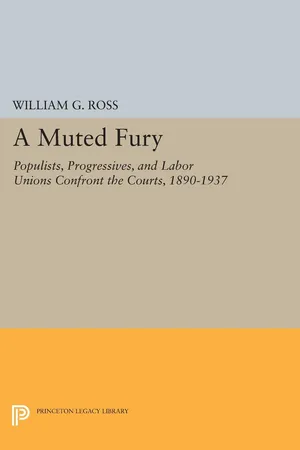
Princeton Legacy Library
Populists, Progressives, and Labor Unions Confront the Courts, 1890-1937
- 352 pages
- English
- PDF
- Available on iOS & Android
Princeton Legacy Library
Populists, Progressives, and Labor Unions Confront the Courts, 1890-1937
About This Book
For half a century before 1937, populists, progressives, and labor leaders complained bitterly that a "judicial oligarchy" impeded social and economic reform by imposing crippling restraints on trade unions and nullifying legislation that regulated business corporations. A Muted Fury, the first study of this neglected chapter in American political and legal history, explains the origins of hostility toward the courts during the Progressive Era, examines in detail the many measures that antagonists of the judiciary proposed for the curtailment of judicial power, and evaluates the successes and failures of the anti-court movements.Tapping a broad array of sources, including popular literature and unpublished manuscripts, William Ross demonstrates that this widespread fury against the judiciary was muted by many factors, including respect for judicial power, internal divisions among the judiciary's critics, institutional obstacles to reform, and the judiciary's own willingness to mitigate its hostility toward progressive legislation and labor. Ross argues that persistent criticism of the courts influenced judicial behavior, even though the antagonists of the courts failed in their many efforts to curb judicial power. The book's interdisciplinary exploration of the complex interactions among politics, public opinion, judicial decision-making, the legislative process, and the activities of organized interest groups provides fresh insights into the perennial controversy over the scope of judicial power in America.Originally published in 1994.The Princeton Legacy Library uses the latest print-on-demand technology to again make available previously out-of-print books from the distinguished backlist of Princeton University Press. These editions preserve the original texts of these important books while presenting them in durable paperback and hardcover editions. The goal of the Princeton Legacy Library is to vastly increase access to the rich scholarly heritage found in the thousands of books published by Princeton University Press since its founding in 1905.
Frequently asked questions
Information
Table of contents
- Cover
- Contents
- Acknowledgments
- Introduction
- 1 The Seeds of Discord
- 2 Challenges to Constitutional Orthodoxy
- 3 Meliorative Measures
- 4 Reconstructing the Bench
- 5 The Judicial Recall Movement
- 6 Theodore Roosevelt and the Judicial Referendum
- 7 Ebb and Flow, 1913-1921
- 8 The Taft Court and the Return of "Normalcy"
- 9 The La Follette Proposal
- 10 The Borah Proposal
- 11 The Supreme Court Calms the Tempest
- 12 The Judicial Issue in the 1924 Election
- 13 Final Conflicts, 1925-1937
- Conclusion
- Index